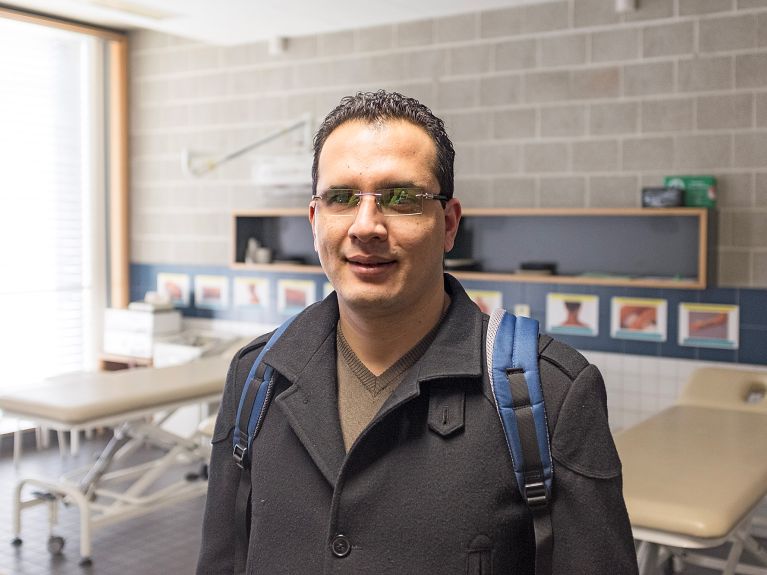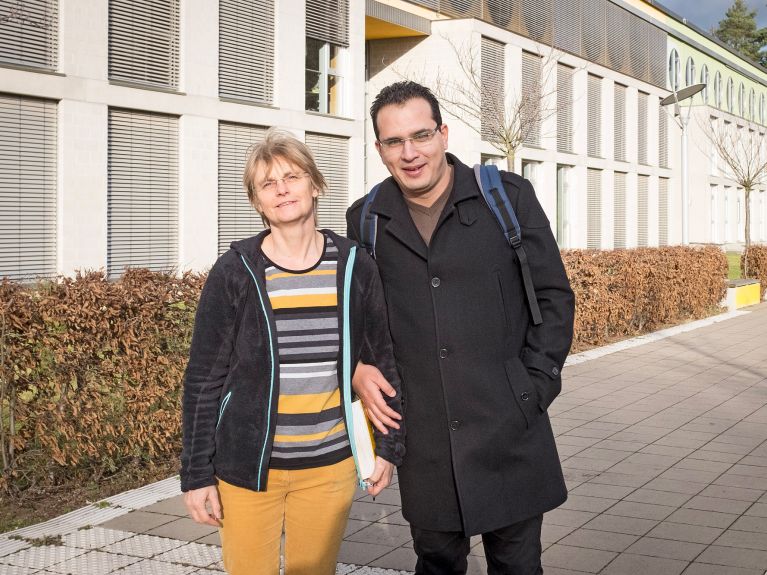The long road to inclusion
Intuition for pressure points: How the blind physiotherapist and ifa CrossCuture fellow Yassine Rihani promotes human rights in Tunisia.

Intuition plays an important role in the life of Yassine Rihani. The 34-year-old Tunisian lost his eyesight in 2006 and has been working as a physiotherapist ever since. As a human rights activist, he also has a feel for the pressure points in society and works to promote the rights of people with disabilities. From October to December 2017 he worked as a CrossCulture Programme fellow at the physiotherapy training centre at Nuremberg Education Centre for the Blind and Visually Impaired.
In his work at the Charles-Nicolle University Hospital in Tunis, Yassine is concerned with more than just the health and wellbeing of his patients. In his spare time he is also actively involved in promoting the rights of people with disabilities. As former President of the Regional Blind Union in Tunis he was an important voice in the struggle for recognition and equal rights for blind and visually impaired people. After many years as President, Yassine now devotes his attention to the inclusion of visually impaired people in the country's National Library.
At the end of 2016, Yassine applied for a place on the ifa (Institut für Auslandsbeziehungen) CrossCulture Programme in order to find out more about new physiotherapy methods and techniques and to learn more about dealing with people with disabilities. He hoped that this would also provide fresh impetus for his work as a human rights activist.
Yassine spent his time in Germany at the Berufsfachschule für Physiotherapie, a physiotherapy training college in Nuremberg. It forms part of the city’s Education Centre for the Blind and Visually Impaired (Bildungszentrum für Blinde und Sehbehinderte) and enables young people to complete a three-year vocational training course that allows them to work in practices, clinics or as independent physiotherapists. "Many blind people have a very strong sense of touch", explains Gertraud Luce-Wunderle Luce, doctor and teacher at the college. This is why it is often a good idea for them to train to be physiotherapists. "Mr Rihani is no exception. I was very impressed by the way he uses his hands on the patients' bodies".
It’s normal to be different
"Inclusion is not a one-way street", explains Karin Gätschenberger-Bahler while crossing the campus at the Education Centre. This concept has particular resonance for the deputy head, as the principle of inclusion has now become an important aspect of all educational institutions. The physiotherapy training centre does not only welcome visually impaired and blind people but also sighted students who would like to embark on a training course. According to Gätschenberger-Bahler, this creates a learning atmosphere in which equality and respect are not just empty phrases but an integral part of the day-to-day work. "We are proud of the fact that we are able to integrate all our vocational students into the labour market", says the deputy head, because a permanent job is vital for active participation in society.

A revolutionary milestone: Article 48 of the constitution
In Nuremberg, Yassine picked up lots of new ideas and gained a renewed sense of optimism for his voluntary work in Tunisia. Fortunately he can now put this enthusiasm to good use as the situation in his home country is currently much more positive. In today’s post-revolutionary Tunisia it is possible to do things that were unthinkable seven years ago. "The old regime wasn’t particularly interested in discussing the rights of people with disabilities. Human rights were generally not much of priority, no matter who you were", recalls Yassine, with reference to the autocratically governed Tunisia under the rule of Ben Ali. Seven years after the regime’s overthrow in 2010/2011, many observers see Tunisia as a beacon of the "Arab spring" in the Middle East and North Africa. In other countries, the desire for change, human rights and co-determination has often resulted in bitter disappointment, but Tunisia has had a new constitution since 27 January 2014, which is considered to be one of the most progressive in the Arab world.
In the rehabilitation area of the Education Centre for the Blind and Visually Impaired, blind and highly visually impaired students are given individual support. For example, they can learn to determine the value of banknotes using simple tools. Simple yet precise: different-sized banknotes are folded and inserted into a gauge and information about their value is transmitted by Braille.
It is important for people to avoid relying on sighted helpers if they want to live independently. Label readers are a simple way of providing this kind of freedom. Touching a label with the tip of the reader makes it possible to record the required text using the microphone. Whenever the reader comes into contact with the label, it replays the message. In this way, clothes or other household items can be clearly identified.
Yassine is particularly pleased about Article 48 of the new constitution, as he fought for it for many years in his capacity as a human rights activist. For the first time in Tunisia's history, it now says: "The state protects people with disabilities from all forms of discrimination. Every disabled citizen is entitled to services that ensure his or her full integration into society. The state shall take all necessary measures to achieve this." A milestone, as Yassine calls it, which was only made possible by the constant pressure put on parliament by activists.
This persistence has certainly paid off. The visibility of various collectively organised initiatives aimed at promoting an active implementation of Article 48 is gradually starting to change society’s perceptions. This is particularly evident in the right to freedom of assembly, which is increasingly being taken up by people with disabilities. In October 2017, dozens of deaf and mute people demonstrated in Tunis to remind the government of its commitment to the right to work and education. At the same time, Yassine wants to stress the importance of the politically independent work of civil society actors in the country. The mistrust of state intervention since the overthrow of 2011 appears to be rooted too deeply.
Looking to the future
Yassine knows exactly what still needs to be done once his visit to Nuremberg has been completed: "We have a lot of plans for Tunisia. There is still a long way to go before we can talk of real inclusion. We must continue it with great courage and perseverance." For example, there is still a great deal to do with regard to local transport and schools in order to enable or simplify access for people with disabilities. Albert Einstein's words give him strength: "Life is like riding a bicycle. To keep your balance, you must keep moving."
Gätschenberger-Bahler and Luce-Wunderle from the physiotherapy training centre in Nuremberg take a very positive view of the three months that Yassine spent with them: "Mr Rihani was a real asset to the college. Of course there were language barriers, but we were still able to learn a great deal from each other. His particular approach to pain therapy, the ‘painkiller’ method, was something new for us", says Luce-Wunderle. They are both very focused on the future, stressing that the road to inclusion is never-ending. But the main thing is that the road is being trodden – in both Germany and Tunisia.